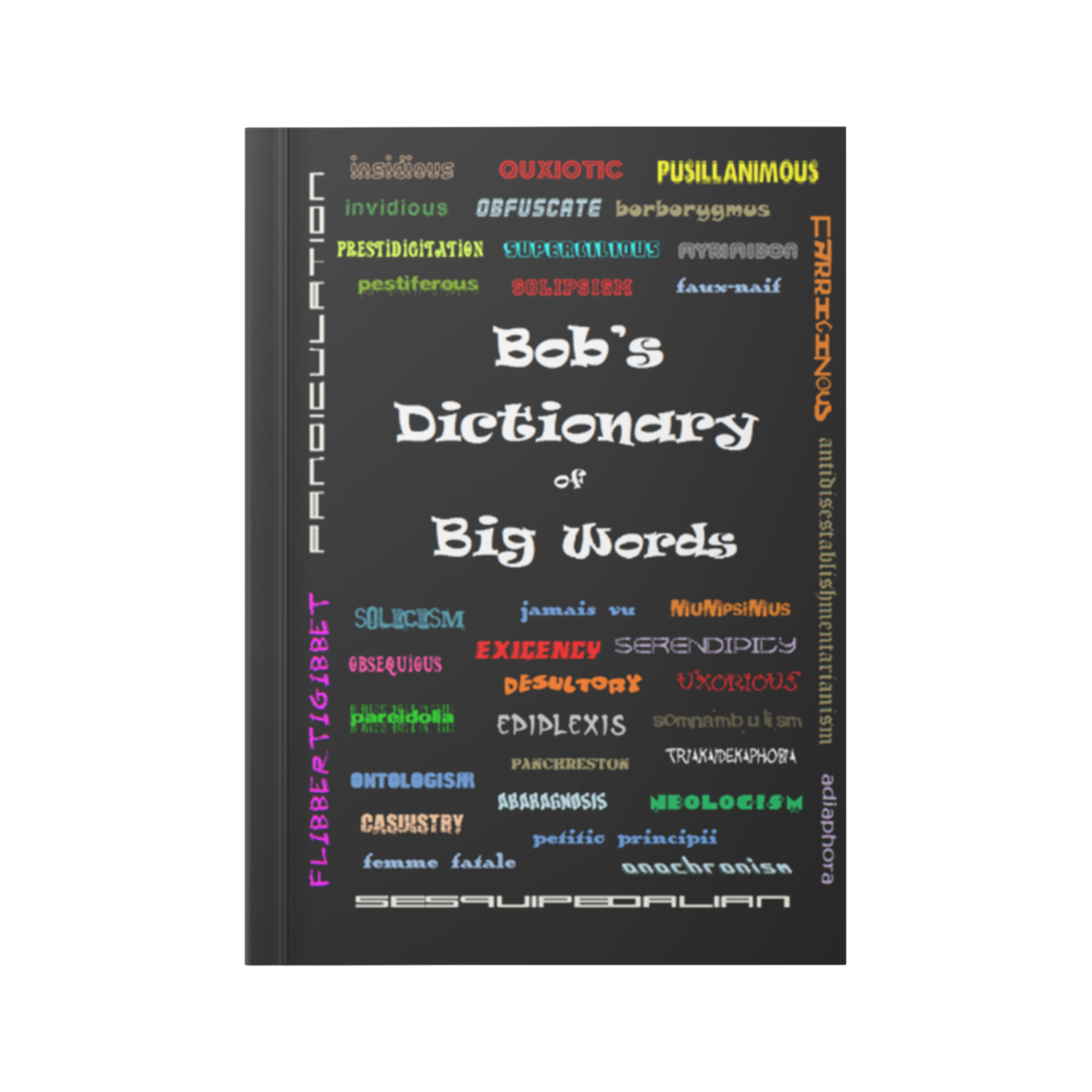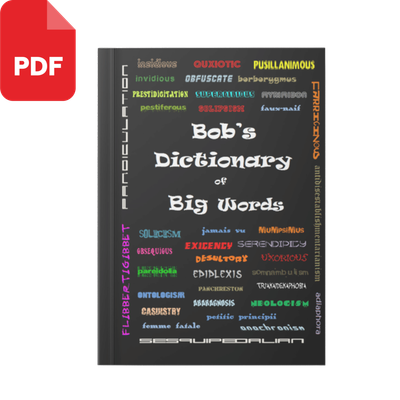
Bob's Dictionary of Big Words - 5.5 x 8.5 inch size (Paperback)
5.5 x 8.5 inch size for $10.95, plus S&H
The Design and Appeal of this Dictionary
Dictionaries come in all shapes and sizes. At one extreme is the Oxford English Dictionary, so massive it is published in 19 volumes and contains over 3 million words. At the other extreme is Webster’s New Pocket Dictionary which contains just under 400 pages and about 35,000 words. Bob’s Dictionary of Big Words has less than 300 pages and about 6,000 words.
The decision on how big a dictionary will be is based mostly on how many words it intends to display and how deeply it delves into defining the words. Regardless of the size of the dictionary, however, all of them contain elementary words which most of us already know. Words such as stop, go, stand, sit, run, walk, so and many other simple words take up numerous pages in dictionaries. For example, the word “run” in its various contexts, hyphenations, and participial forms in Webster’s Unabridged Third International Dictionary takes up almost three full pages in an eye-straining 5-point font, ending up with over 10,000 words in the definition! It’s not that having words defined exhaustively is a bad thing. Rather, if you don’t want to spend time wading through word meanings you already know and instead want a dictionary that contains only sophisticated, precise, impressive and thought provoking words, then Bob’s Dictionary of Big Words is for you.
For example, words such as "solipsism" (the theory that self is the only object of real knowledge or that nothing but self exists) or "invidious" (likely to cause ill will or resentment; giving offense because an act is unfair or unjust) or "laconic" (using few words; brief in speech or expression) or "epagoge" (a rhetorical argument by induction) or "exoteric" (that which can be understood by the general public) or "farraginous" (consisting of various materials; confused; jumbled) or "jejune" (flat and uninteresting; barren) or "redintegrate" (to make whole again; restore to a perfect state) are bigger and more complex than words like “stop” and “go” and are certainly not as common, but they are important words to know and use when writing and speaking the English language. They are invaluable in getting one’s point across.
Having a dictionary that concentrates on these kinds of words while at the same time eliminates words like “stop” and “go” is also practical because it reduces unnecessary page turning and having to handle a big and bulky dictionary. One can have this dictionary as a traveling companion and read it at one’s leisure to find fascinating words quickly and easily; words that one will remember and use for a lifetime. In fact, one can even use it for bedtime reading to think about a few valuable and impressive words for the next day. It is so concise and readable that one can virtually memorize the definitions. In fact, we have limited the number of words in the dictionary precisely so that they can be memorized more easily.
Of course, dictionaries of this sort cannot contain all the sophisticated and useful words that are in the English language. Obviously, we have selected only certain words, words that we believe are common and practical enough to be a vital part of an English-speaking person’s normal vocabulary. As such, we have ignored most technical, scientific, and legal words since they are used mainly in specialized fields not common in everyday speech and writing. We have also eliminated words that use common prefixes (e.g., re- trans- un- tri- super- non-) since the meaning of the whole word is rather obvious once you know the meaning of the root word (e.g., “reread” as opposed to “read”; “undo” as opposed to “do”). We sometimes include small words but usually because they are incisive. Although rarely, sometimes we include slang words, such as “chutzpah” (boldness) or “Bob’s your uncle” (you know the rest; that’s all there is to it) because they have a unique practical value in English discourse. We also include select foreign words and phrases for the same reason, such as “ex post facto” (made or done after something, but applying to it) or “fait accompli” (a thing completed and therefore no longer worth opposing) or “ipse dixit” (a dogmatic assertion or opinion based only on one’s own authority) or “habeas corpus” (an order requiring a prisoner be brought before a judge to decide whether he is being held lawfully).
Parts of Speech
Many words come in several parts of speech (e.g., verb, noun, adjective, adverb). It would obviously be redundant and space-consuming if we listed all the parts of speech of a particular word and gave each a definition, so we have selected only the one form of each word that we believe is the most practical. With most words we include the Latin, Greek, French, German or other language derivations of the English words. This helps in remembering the definition, since one can often figure out the definition just by knowing the meaning of the foreign root words. Whereas most English words are derived from Latin, in actuality, many English words are ultimately derived from Greek, since many Latin words are derived from the Greek.
Accenting Syllables
Instead of accent marks to point out the syllable to be emphasized, we have opted to underline the syllable. We do not use fancy pronunciation marks (e.g., ǝ ȇ ǡ) since we have found that they make the text too cumber-some and sometimes lend themselves to making the pronunciation of the word more difficult to achieve than would otherwise be the case. We also limit the definition to the first or second usage of the word, although there are many exceptions. Overall, we try to make the definition as simple as possible. Our goal is to teach the English speaker the basic definitions of many interesting words, not to exhaust the definition of a particular word. For cases in which the reader wants more precise pronunciation tools or exhaustive definitions we suggest that he consult a dictionary designed for that purpose. Economy of space and a select choice of words was foremost in our decision to adopt the principles of this unique dictionary.
Font Choice
Whereas many dictionaries try to cram in a multitudinous assortment of words on each page and are thus forced to use very small print that is difficult to read (e.g., Webster’s Third International Dictionary), we have chosen the simple Calibri style with 9-point font. Not only does this make for easier reading but it also helps to create a photographic picture of the word in one’s mind. Because our font is big and bold, one can almost see in one’s mind the word and its definition after he has closed the dictionary.


